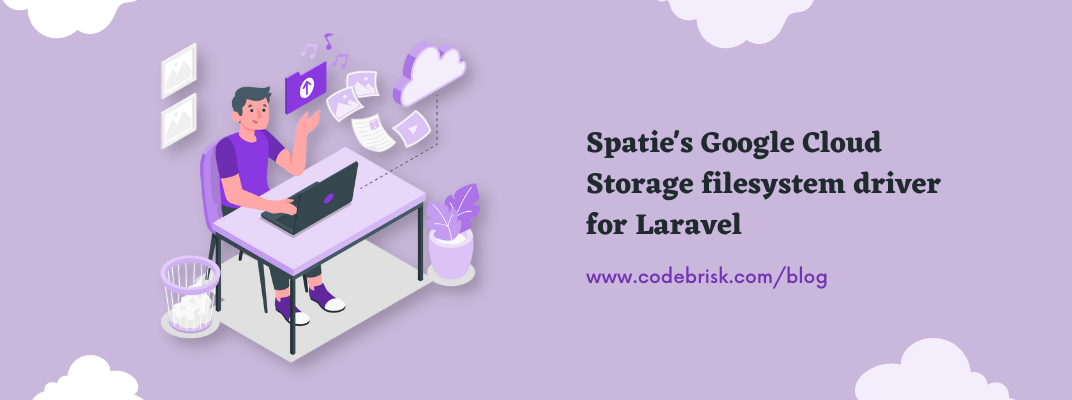Blog Detail
10
Mar
arrow_back Google Cloud Storage Filesystem Driver for Laravel by Spatie
Spatie has launched the Google Cloud Storage filesystem driver for Laravel 9. It is using Flysystem v2 and its own GCS adapter.
Installation
You can install the package via composer:
composer require spatie/laravel-google-cloud-storage
Next, add a new disk to your filesystems.php config:
'gcs' => [
'driver' => 'gcs',
'key_file_path' => env('GOOGLE_CLOUD_KEY_FILE', null), // optional: /path/to/service-account.json
'key_file' => [], // optional: Array of data that substitutes the .json file (see below)
'project_id' => env('GOOGLE_CLOUD_PROJECT_ID', 'your-project-id'), // optional: is included in key file
'bucket' => env('GOOGLE_CLOUD_STORAGE_BUCKET', 'your-bucket'),
'path_prefix' => env('GOOGLE_CLOUD_STORAGE_PATH_PREFIX', ''), // optional: /default/path/to/apply/in/bucket
'storage_api_uri' => env('GOOGLE_CLOUD_STORAGE_API_URI', null), // see: Public URLs below
'visibility' => 'public', // optional: public|private
'metadata' => ['cacheControl'=> 'public,max-age=86400'], // optional: default metadata
],
Usage
$disk = Storage::disk('gcs');
$disk->put('avatars/1', $fileContents);
$exists = $disk->exists('file.jpg');
$time = $disk->lastModified('file1.jpg');
$disk->copy('old/file1.jpg', 'new/file1.jpg');
$disk->move('old/file1.jpg', 'new/file1.jpg');
$url = $disk->url('folder/my_file.txt');
$url = $disk->temporaryUrl('folder/my_file.txt', now()->addMinutes(30));
$disk->setVisibility('folder/my_file.txt', 'public');
Authentication
The Google Client uses a few methods to determine how it should authenticate with the Google API.
- If you specify a path in the key
key_filein disk config, that json credentials file will be used. - If the
GOOGLE_APPLICATION_CREDENTIALSenv var is set, it will use that.
putenv('GOOGLE_APPLICATION_CREDENTIALS=/path/to/service-account.json');
- It will then try to load the key file from a ‘well-known path’:
- windows: %APPDATA%/gcloud/application_default_credentials.json
- others: $HOME/.config/gcloud/application_default_credentials.json
-
If running in Google App Engine, the built-in service account associated with the application will be used.
-
If running in Google Compute Engine, the built-in service account associated with the virtual machine instance will be used.
-
If you want to authenticate directly without using a json file, you can specify an array for
key_filein disk config with this data:
'key_file' => [
'type' => env('GOOGLE_CLOUD_ACCOUNT_TYPE'),
'private_key_id' => env('GOOGLE_CLOUD_PRIVATE_KEY_ID'),
'private_key' => env('GOOGLE_CLOUD_PRIVATE_KEY'),
'client_email' => env('GOOGLE_CLOUD_CLIENT_EMAIL'),
'client_id' => env('GOOGLE_CLOUD_CLIENT_ID'),
'auth_uri' => env('GOOGLE_CLOUD_AUTH_URI'),
'token_uri' => env('GOOGLE_CLOUD_TOKEN_URI'),
'auth_provider_x509_cert_url' => env('GOOGLE_CLOUD_AUTH_PROVIDER_CERT_URL'),
'client_x509_cert_url' => env('GOOGLE_CLOUD_CLIENT_CERT_URL'),
],
Public URLs
The adapter implements a getUrl($path) method which returns a public URL to a file.
Note: Method available for Laravel 5.2 and higher. If used on 5.1, it will throw an exception.
$disk = Storage::disk('gcs');
$url = $disk->url('folder/my_file.txt');
// http://storage.googleapis.com/bucket-name/folder/my_file.txt
If you configure a path_prefix in your config:
$disk = Storage::disk('gcs');
$url = $disk->url('folder/my_file.txt');
// http://storage.googleapis.com/bucket-name/path-prefix/folder/my_file.txt
If you configure a custom storage_api_uri in your config:
$disk = Storage::disk('gcs');
$url = $disk->url('folder/my_file.txt');
// http://your-custom-domain.com/bucket-name/path-prefix/folder/my_file.txt
For a custom domain (storage api uri), you will need to configure a CNAME DNS entry pointing to storage.googleapis.com.
Temporary / Signed URLs
With the latest adapter versions, you can easily generate a signed URLs for files that are not publicly visible by default.
$disk = Storage::disk('gcs');
$url = $disk->temporaryUrl('folder/my_file.txt', now()->addMinutes(30));
// https://storage.googleapis.com/test-bucket/folder/my_file.txt?GoogleAccessId=test-bucket%40test-gcp.iam.gserviceaccount.com&Expires=1571151576&Signature=tvxN1OS1txkWAUF0cCR3FWK%seRZXtFu42%04%YZACYL2zFQxA%uwdGEmdO1KgsHR3vBF%I9KaEzPbl4b7ic2IWUuo8Jh3IoZFqdTQec3KypjDtt%02DGwm%OO6pWDVV421Yp4z520%o5oMqGBtV8B3XmjW2PH76P3uID2QY%AlFxn23oE9PBoM2wXr8pDXhMPwZNJ0FtckSc26O8PmfVsG7Jvln%CQTU57IFyB7JnNxz5tQpc2hPTHbCGrcxVPEISvdOamW3I%83OsXr5raaYYBPcuumDnAmrK%cyS9%Ky2fL2B2shFO2cz%KRu79DBPqtnP2Zf1mJWBTwxVUCK2jxEEYcXBXtdOszIvlI6%tp2XfVwYxLNFU
If you want to know more about this package you can visit its complete documentation and source code on Github.
Published at : 10-03-2022
Rizwan Aslam
I am a highly results-driven professional with 12+ years of collective experience in the grounds of web application development especially in laravel, native android application development in java, and desktop application development in the dot net framework. Now managing a team of expert developers at Codebrisk.

Launch project
